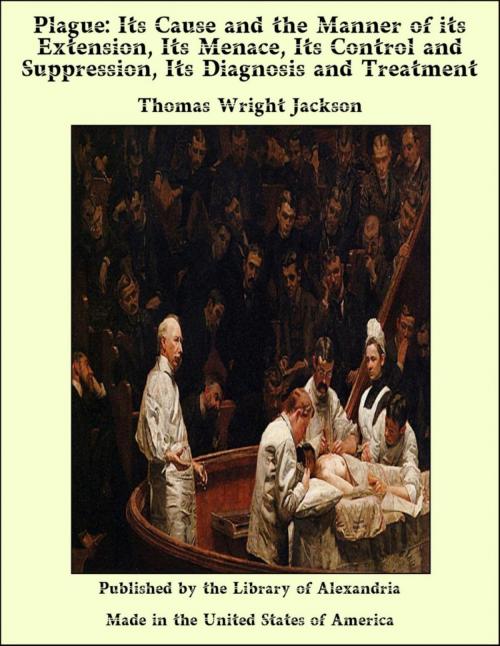Plague: Its Cause and the Manner of its Extension, Its Menace, Its Control and Suppression, Its Diagnosis and Treatment
Nonfiction, Religion & Spirituality, New Age, History, Fiction & Literature| Author: | Thomas Wright Jackson | ISBN: | 9781465588319 |
| Publisher: | Library of Alexandria | Publication: | March 8, 2015 |
| Imprint: | Language: | English |
| Author: | Thomas Wright Jackson |
| ISBN: | 9781465588319 |
| Publisher: | Library of Alexandria |
| Publication: | March 8, 2015 |
| Imprint: | |
| Language: | English |
The question of the need for new books upon medical topics must ever remain undecided, by general agreement, in the medical profession. There is no such thing in medical literature as an insistent demand from the profession for new volumes upon old topics. Authors need not hope, therefore, to create the impression that they are meeting long-felt though unexpressed wants of medical readers in launching new books. On the other hand, the creator of a new volume upon an old subject should seek justification for literary paternity in the progressive changes in the status of our knowledge of disease, its causes, prevention, and cure. Such changes are admittedly going on with a certain degree of constancy and at such a rate of frequency that new presentations of old themes, are both justified and desirable from time to time. With this idea in mind and with the desire to present, in useful and practical form, a work which shall contain at least some unhackneyed material and which shall represent modern studies and a record of actual control work done in this justly-dreaded disease, the following pages are submitted to the medical profession and to sanitarians generally. With a profound respect for the laboratory worker and his work and with a profound conviction that to him belongs the greater measure of credit for real accomplishment in connection with plague up to the present time, I desire to insist that the true utility of knowledge gained within laboratory walls lies in its intelligent application in the outer world and that ofttimes this application must be made by men who are themselves without extended laboratory training. An appreciation of principles—with an intelligent ability to accept, to appropriate, to apply and, most of all, to refrain from entering without due preparation the domain of the laboratory worker—is an indispensable requisite in the equipment of the practical sanitarian, upon whom must fall the responsibilities of success or failure in combating the disease we are now to consider.
The question of the need for new books upon medical topics must ever remain undecided, by general agreement, in the medical profession. There is no such thing in medical literature as an insistent demand from the profession for new volumes upon old topics. Authors need not hope, therefore, to create the impression that they are meeting long-felt though unexpressed wants of medical readers in launching new books. On the other hand, the creator of a new volume upon an old subject should seek justification for literary paternity in the progressive changes in the status of our knowledge of disease, its causes, prevention, and cure. Such changes are admittedly going on with a certain degree of constancy and at such a rate of frequency that new presentations of old themes, are both justified and desirable from time to time. With this idea in mind and with the desire to present, in useful and practical form, a work which shall contain at least some unhackneyed material and which shall represent modern studies and a record of actual control work done in this justly-dreaded disease, the following pages are submitted to the medical profession and to sanitarians generally. With a profound respect for the laboratory worker and his work and with a profound conviction that to him belongs the greater measure of credit for real accomplishment in connection with plague up to the present time, I desire to insist that the true utility of knowledge gained within laboratory walls lies in its intelligent application in the outer world and that ofttimes this application must be made by men who are themselves without extended laboratory training. An appreciation of principles—with an intelligent ability to accept, to appropriate, to apply and, most of all, to refrain from entering without due preparation the domain of the laboratory worker—is an indispensable requisite in the equipment of the practical sanitarian, upon whom must fall the responsibilities of success or failure in combating the disease we are now to consider.















